_We may earn revenue from the products available on this page and participate in affiliate programs. Learn more ›
_
I’ve used several bow sights over the years—from standard 5-pin models and single-pin movers to multip-pin makes on a rack-and-pinion adjustment. And unless you’re a traditional archer, you should invest in one of these quality sights for your bow.
The best thing about today’s bow sights is you have options. If you’re a whitetail and turkey hunter who knows you’ll never shoot an arrow beyond 40 yards, you don’t need a five-pin moveable sight with more bells and whistles than a Tesla. You can get away with a budget-friendly single-pin mover or a standard fixed-pin bow sight.
Those who roam the West searching for mule deer, pronghorn, big horn sheep, and other big game species will want to go a different route. Their sight choice should be a top-end dial-to-the-yard moveable sight with second- and third-axis adjustments, micro-windage and elevation adjustments, and steel pins in a tougher-than-nails housing.
During my bowhunting tenure, I’ve hunted from the Rockies to the Blue Ridge Mountains, chasing many different species. And throughout my adventures, I’ve hunted with and tested all kinds of sights. I took my experience in the mountains, fields, and at the range to develop this list of the best bow sights.
Best Overall: Spot-Hogg Fast Eddie Triple Stack PM
Best for Whitetails: HHA Tetra RYZ
Best Budget: TruGlo Veros 5-Pin
Best Rangefinding Sight: Garmin Xero A1i Pro Bow Sight
Best Multi-Pin Moveable Sight: Black Gold Ascent Verdict Assault
Best Single-Pin Sight: CBE Trek Pro Sight
Best Newcomer Sight: Dialed ARXOS
How We Picked the Best Bow Sights
The most important thing to remember when choosing a sight is to pick one that fits your needs. I tested every sight on this list—whether at 3D tournaments or in the field, and each proved its worth. A quality bow sight must have purposeful features, not just meaningless technologies. I look for a durable build, bright fiber optics, and windage and elevation adjustments. All of the sights on this list meet those requirements.
Since hunters pursue game all across the country for different species in various habitats, I selected a wide range of bow sights. Some are single pins, and some are triple pins set on a vertical post. Others are fixed position fixed-pin sights that promise easy setup and undeniable reliability. But most importantly, every sight on this list excels at the range and in the field. You just need to determine what will work best for your bow and your style of hunting.
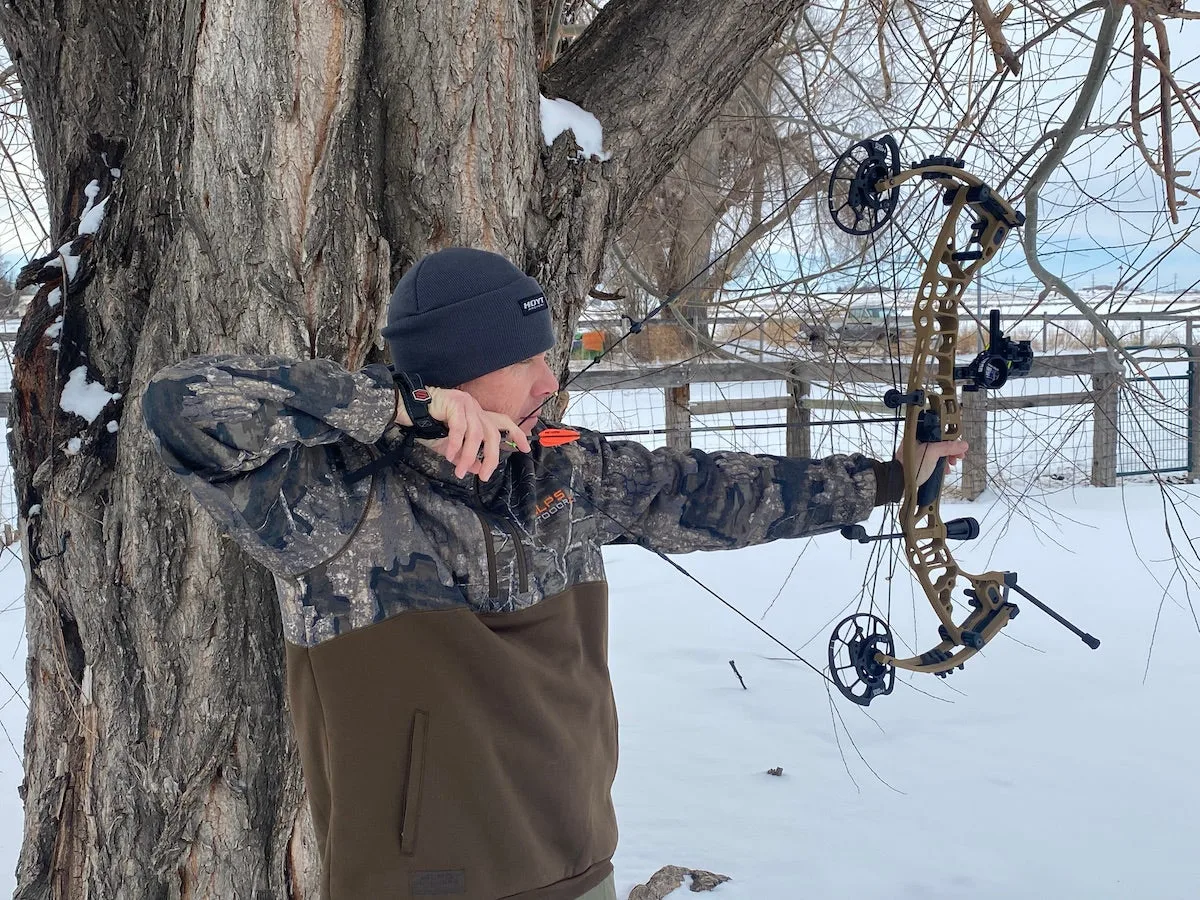
Best Bow Sights: Reviews & Recommendations
Best Overall: Spot-Hogg Fast Eddie Triple Stack PM
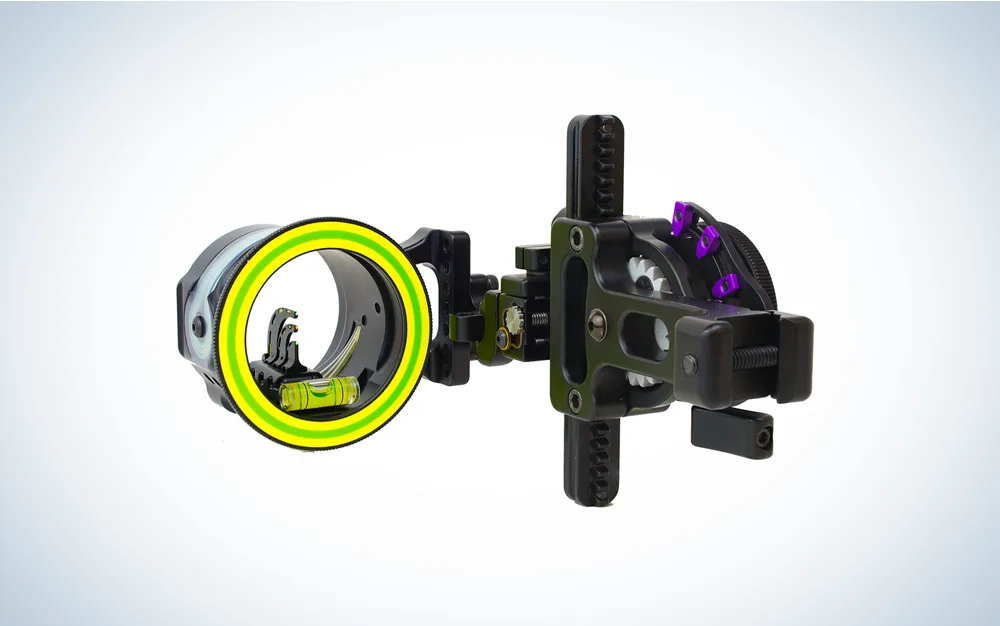
Specs
Three individually adjustable vertical pins
6061 aluminum construction
.010″ & .019″ pin diameters
Pros
Micro-adjustable second & third axis for exact leveling
HRD Technology—no slop or buzz ever
Improved yardage dial
Toolless adjustment
Riser-mount clamp
Cons
Expensive
I’ve shot many Spot-Hogg sights over the years, and this is their best make to date. The three-pin vertical design means an unobstructed housing and the solid Picatinny sight mount attaches to the front (not the side) of the bow’s riser. This design eliminates the sight mounting block and mounting screws, which creates a streamlined sight-to-riser bond and helps keep weight down. It comes with several sight tapes, and dial-to-the-yard accuracy is achievable. The sight has second- and third-axis leveling, and windage and elevation adjustments are quick via the toolless design. The Fast Eddie Triple Stack PM is built like a tank and finished with a fade, chip, and scratch-resistant Type II anodized hard coat.
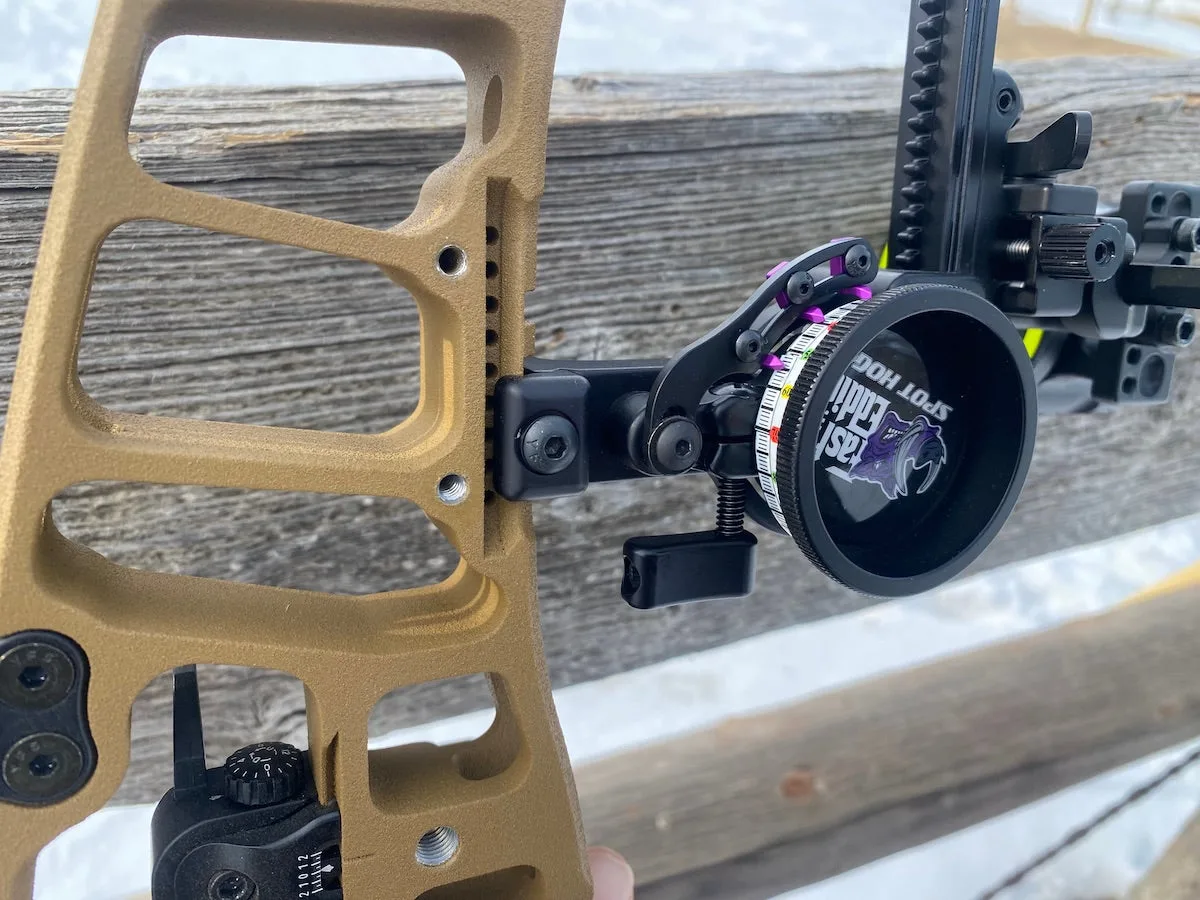
Best for Whitetails: HHA Tetra RYZ
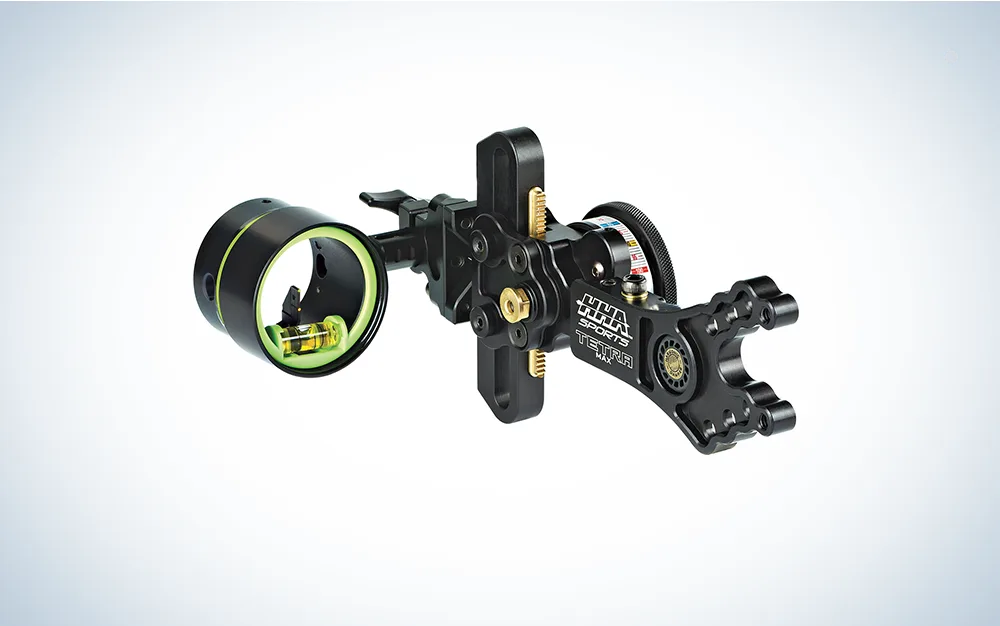
Specs
2.1-inches of travel
Yellow or red secondary pin
Multiple mounting options
Pros
Two vertical pins for precise aiming
Maximum brightness control via mechanical rheostat
Toolless adjustments
Gripable yardage wheel with dual stainless needle yardage pointers
Cons
Expensive
Lack of elevation adjustment
There is no disputing that HHA is the king of the single-pin world. Models like its Tetra and Tetra Max have been settled tight to the shoulder on more whitetails than one could imagine. For 2023, I cheer the RYZ platform. Durable as the day is long, this sight sets two pins on a single vertical post to ensure no housing obstructions, and the fixed secondary pin and secondary yardage marker means you can adjust your aiming point at full draw when that big buck takes a few more steps. The sight features 2.1 inches of travel, and users can choose a yellow or red secondary pin in sizes of .010″ or .019″. The Tetra RYZ is available in a fixed frame, a pair of dovetail options, and a Hoyt Picatinny frame. Both Dovetails are compatible with Mathews’ Bridgelock Technology.
Best Budget: TruGlo Veros 5-Pin
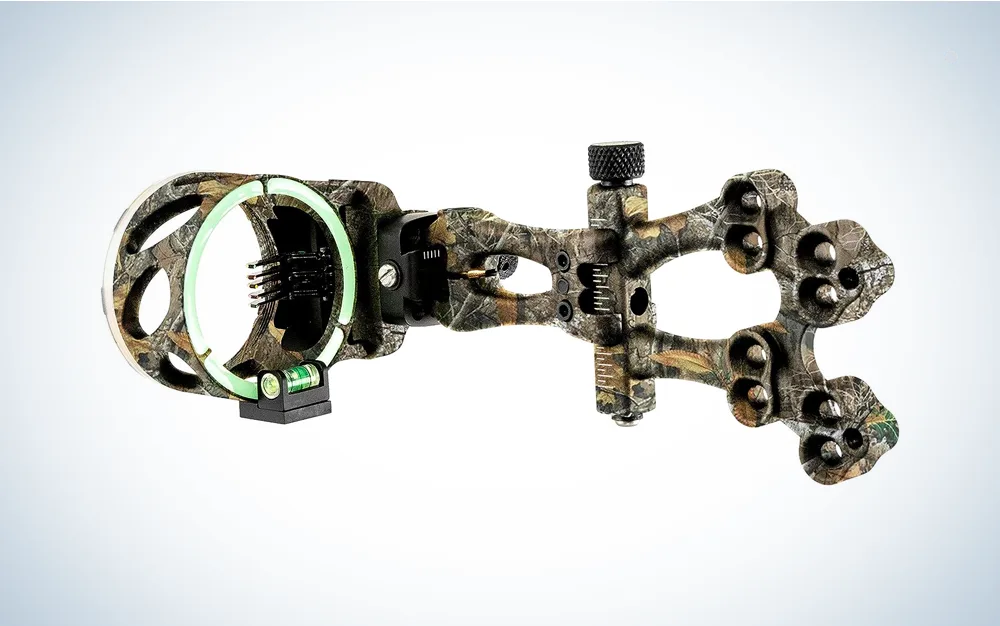
Specs
Ambidextrous
3 fixed .019″ pins/2 fixed .010″ pins
Aluminum build
Pros
Decreasing Pin Diameter for improved long-range accuracy
Tru-Touch Soft Coating to reduce noise and boost protecion
Extra-long fibers for max brightness
Pro-Brite pin design
Cons
Some slop over time
Pin adjustment
TruGlo’s Tetra is an amazing fixed five-pin sight that hits the under-$100 mark. I have always cheered their pin design that decreases in diameter. Smaller .010″ pin sizes block less of the target and allow for more precise aiming at longer distances. Typically, a five-pin sight is set up with pins set for 10, 30, 40, 50, and 60 yards. With the Veros, your bottom two pins (the 50 and 60) are the smaller diameter pins. They are exceptionally bright but don’t create a halo effect even in ultra-bright sunlight, and the shooter’s ring boosts daylight visibility and low-light glow. The Veros is 2nd- and 3rd-axis adjustable—a win for a sight in this price range—and I like the create-no-game-spooking-noises Tru-Touch soft-feel technical coating.
Best Rangefinding Sight: Garmin Xero A1i Pro Bow Sight
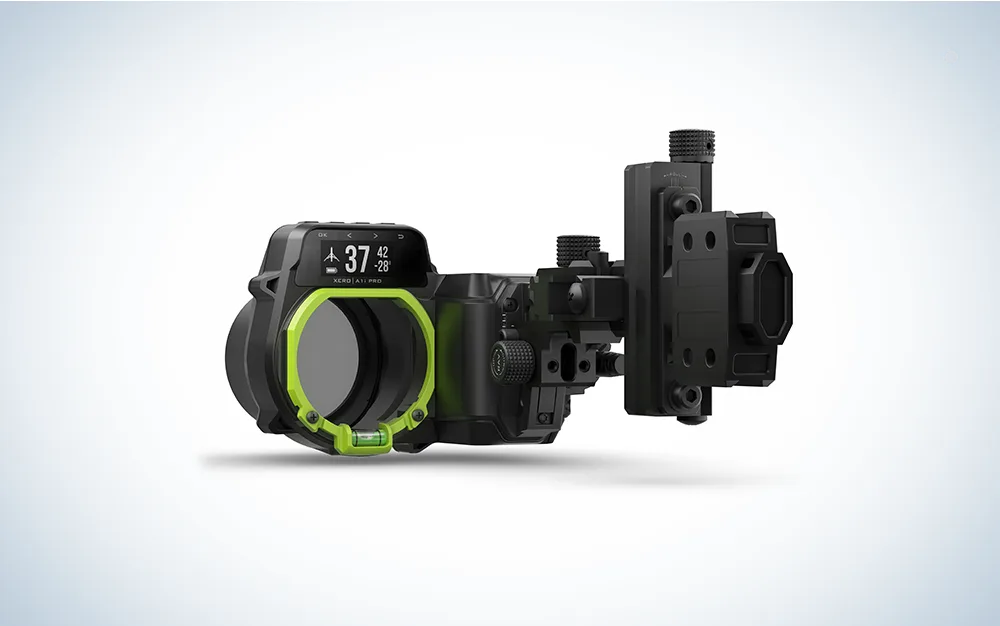
Specs
18 ounces
160×68 display resolution
IPX7 waterproof
Pros
All-in-one rangefinding and aiming system
Push-button operation for quick yardages
Easy instructional setup menu
One-year battery life
Cons
Very expensive
Not legal in all states
This is an easy-to-use bow sight that automatically calculates the range to the target by pressing a button mounted to the front of the bow’s grip. The onboard setup menu means you don’t have to work for NASA to get the sight working correctly—I was dialed to 60 yards in less than 20 minutes. And I love that shooters can select the aiming references (single or multiple fixed references set at 10-yard intervals). The sight is micro-adjustable for elevation and windage, and pitch and yaw adjustments mean the display screen in the scope is perfectly flat to your eye. Shooters also have the choice of pin color, and while I have only used this sight on the range, I would have zero quarrels about taking it to the bowhunting woods.
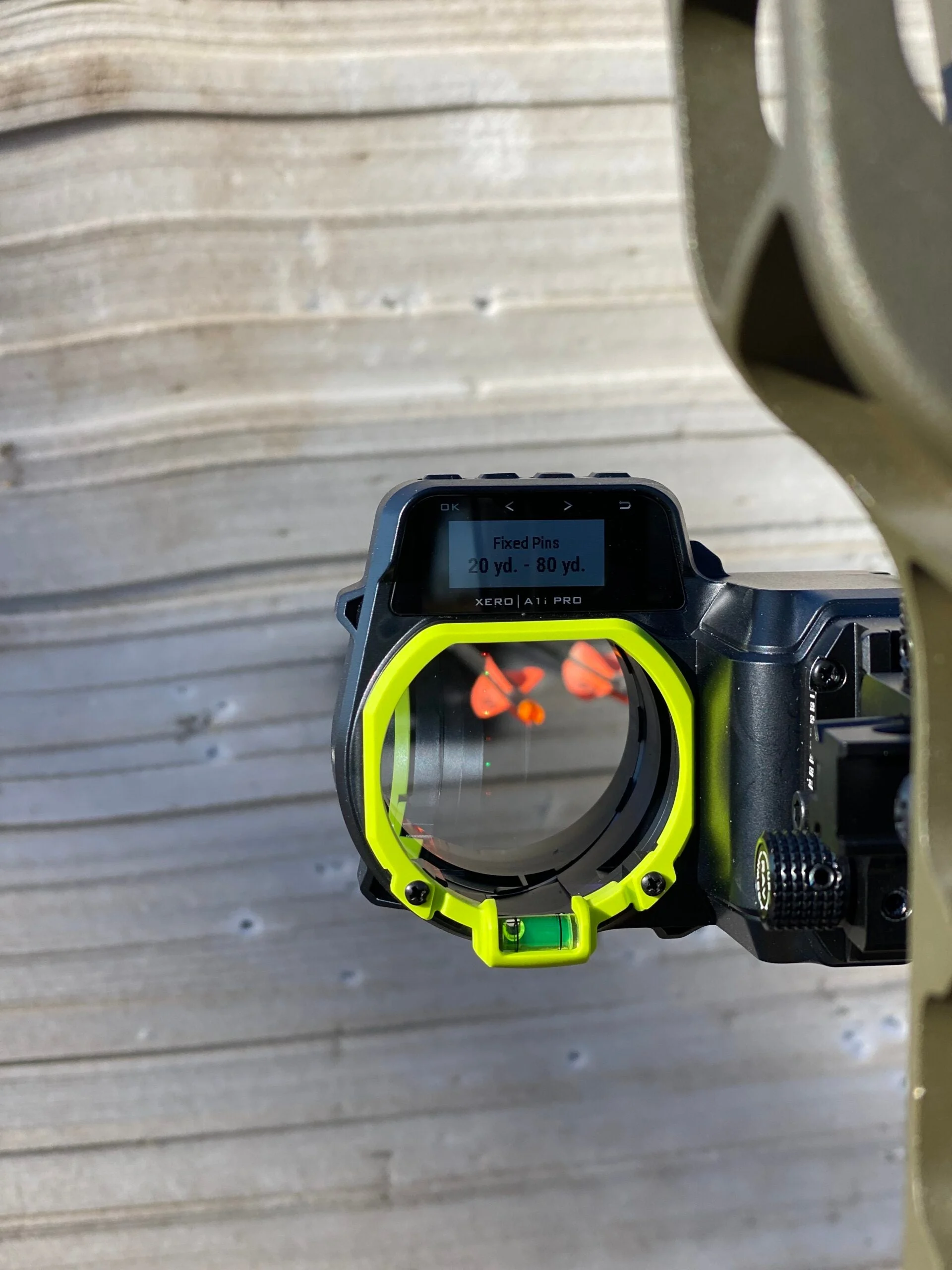
Best Multi-Pin Moveable Sight: Black Gold Ascent Verdict Assault
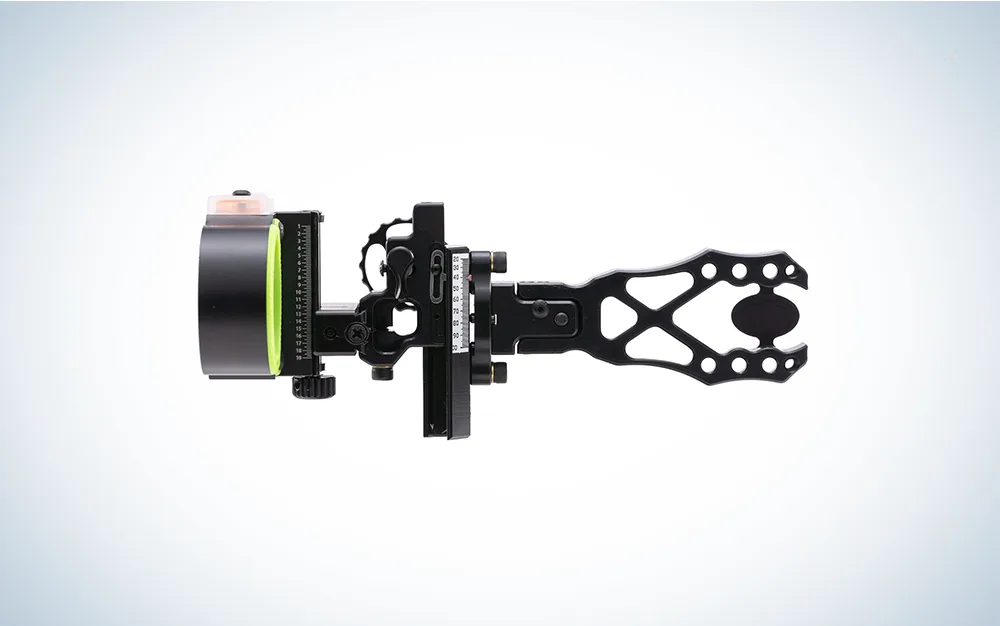
Specs
10 ounces
X-Frame mount
1.75 in. housing
Pros
.019″ Micro Groove pins create less target obstruction
Photochromatic shell adapts to outside lighting conditions
Micro-adjustable third axis for better angled-shot accuracy
Dial of Death yardage wheel is fast with no slop
Cons
Almost too light
Durability could be an issue
I have to rave about the PhotoChromatic shell. No, it’s nothing new, but there’s a reason this technology has been a Black Gold staple for years—it works. The pin brightness is always just right, no matter the outside lighting conditions. I appreciate the 54-yardage tapes, and the Dial of Death (yardage wheel) sits out and away from the sight body, which boots ease of use, and the single indicator needle makes dialing to the precise yardage a breeze. Having five set aiming points and being able to use your bottom pin as a slider comes in handy, and I appreciate the fact that Black Gold went the extra mile to create Micro Groove pins that make less obstruction in the housing. One of the knocks on multi-pin sights is they produce too much housing clutter. The sight tape sets in an easy-to-read position and individual pin adjustments are smooth and precise.
Best Single-Pin Sight: CBE Trek Pro Sight
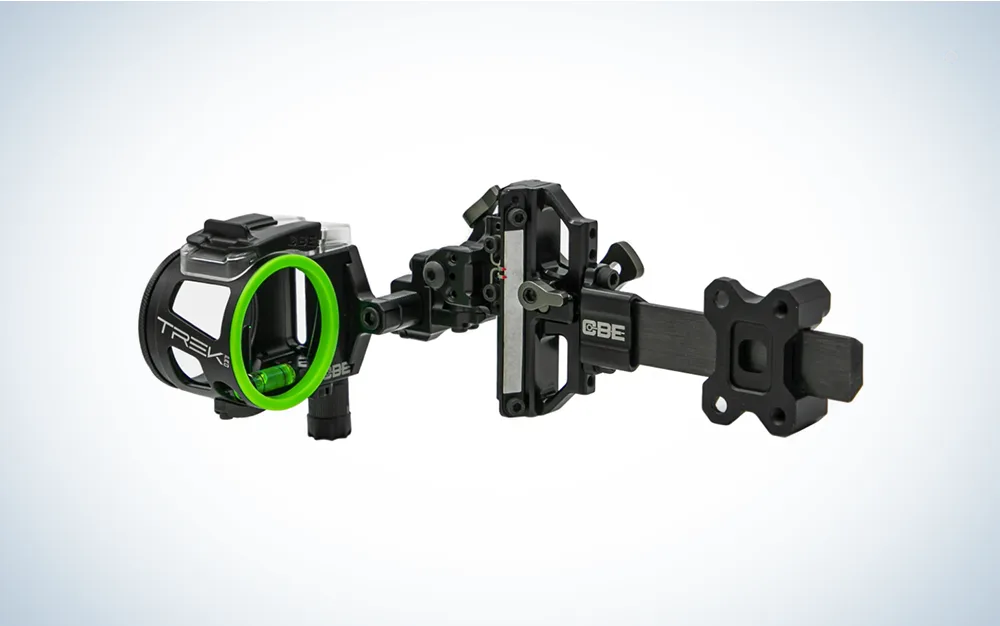
Specs
.010″ or .019 pin size
10.3 ounces
Machined aluminum
Pros
Dead Stop design stops the top pin at set yardage
Laser-engraved aluminum sight tapes
Carbon Fiber Extension Dovetail Sight Bar keeps weight down
Interchangeable fluorescent peep alignment rings
Cons
Yardage wheel unlock is small
You can’t beat the Carbon Fiber Dovetail Bar Mount’s strength-to-weight ratio, and I applaud the multiple mounting positions. Dovetail adjustments to move the sight toward or away from the riser are smooth, and there is no guessing—the ball detent design is exact. Another win of this single pin is the clearly labeled and easy-to-use 2nd- and 3rd-axis adjustments. The Rapid Drive system is quick, making yardage adjustments easy and precise. Shooters love customization, and beside of being able to select between a .019″ and .010″ vertical Blade-Style pin, the sight comes with four interchangeable housing peep alignment rings. I love CBE Sights’ sleek, streamlined build, and the Trek Pro follows suit. As good as waterproof tapes are, you can’t beat the laser-engraved aluminum sight tapes that attach to the sight body via a small Phillips screwdriver.
Best Newcomer Sight: Dialed ARXOS
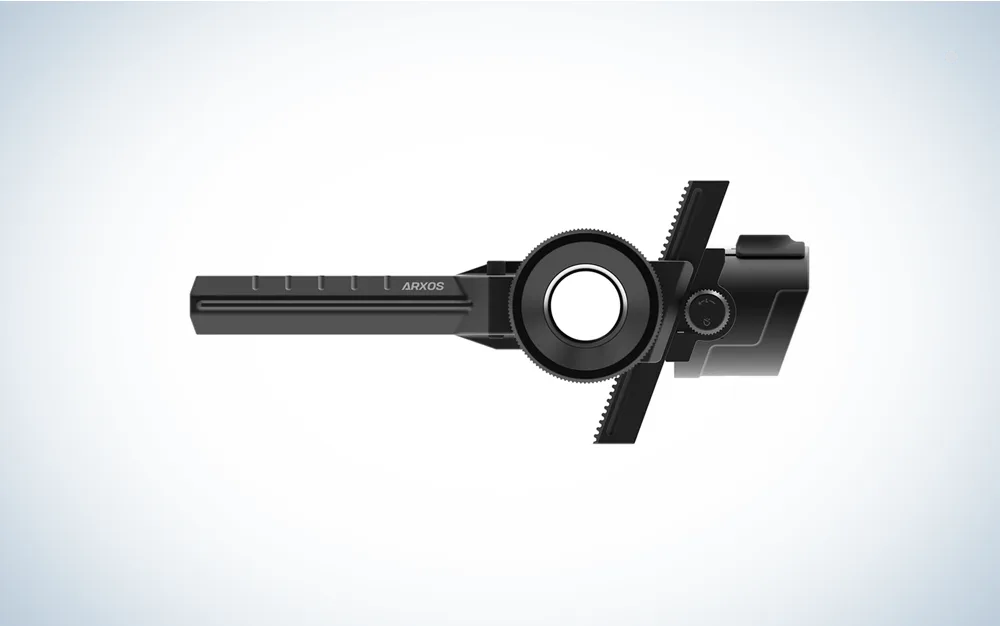
Specs
Dovetail or Picatinny mounts
12.5 ounces Pic & Dove
Solid 6061 Aluminum
Pros
Design it how you want it
Built like a tank and ready to take on any hunt
Angled vertical bar extends the sight’s elevation range
Dual aiming points on a single vertical plane
Cons
Price
Expected more range from vertical bar
It looks futuristic and cool, and it is. I like choosing the mounting method, and for those that crave customization, this bow sight delivers it in spades. Pin sizes of .010″ and .019″ are available, and you can select whether you want to run your tape inside or outside. Other custom features include many frame color options and even more dial color options. If your goal is to make your bow sight stand out from the crowd, Dialed is the company to go with.
Of course, for a sight at this price point, it also delivers in the technology arena. The big story is the angled vertical bar, which brings the scope closer to your eye as you lower it for more extended-distance shooting. It works, and you can expect more vertical gang adjustment with this sight. The size of the Void Dial wheel is perfect—large and easy to grip—and I like the single-pin design with a second, lower aiming point on the same vertical plane. The sight’s leveling bubble sits at the top of the housing, and I promise there is nothing traditional about this sight’s build.
Things to Consider Before Buying a Bow Sight
The first question you must ask yourself is: What purpose do I want my sight to serve? If you aim to bust the lungs of whitetails and turkeys—animals commonly harvested inside 40 yards—you can choose a single-pin moveable or a 3- or 5-pin fixed sight. Plenty of single-pin sights won’t break the bank, and most every 3- or 5-pin fixed sight comes in under the $100 mark. Don’t pay for what you don’t need.
If you like to stretch out your yardage and plan to harvest animals beyond 50 yards and sling carbon beyond 100 yards during practice sessions, you need a single- or multi-pin moveable sight. When shooting distance, dial-to-the-yard accuracy is paramount.
You also need to consider pin size. While .019″ is standard, many archers prefer graduating pins with at least one .019″ pin for close-range shots and a more precise .010″ pin for longer-range shots.
Axis Adjustments
Not all sights include leveling features, but if you’re going to be shooting on uneven ground at up and downhill angles, your need a sight with second- and third-axis leveling features.
The second axis refers to the level of the sight head pins and runs straight through your housing as you look through it. If the second axis is off, you will experience left and right misses, much like if you tilt your riser at full draw to the left or right.
The third axis runs parallel to your body through the center of your sight, and when shooting on level ground, a sight’s third axis means nothing. However, the third axis setting is ultra-important when shooting uphill or downhill. An uphill angle shot at 60 yards could hit several feet to the left or right of the intended target if the sight’s third axis is not set correctly.
FAQs
Q: How much does a sight cost?
You will find sights that fall under $100 and those that will break the $1K mark. Knowing what sight is right for you means evaluating your hunting style and picking a sight that matches that style. For example, a spot-and-stalk mule deer hunter will want a moveable sight with second- and third-axis adjustment and more fancy-to-do technologies than a whitetail-only hunter that knows they will never take a shot beyond 40 yards.
Q: What is the best sight mounting system?
As with pin selection, mounting options are a personal preference. You should know that dovetail and Picatinny-style mounts drive the price of a sight up.
A standard mount includes a sight body and an all-in-one bracket system that attaches to the side of the riser via a pair of set screws. A dovetail mount consists of a mounting bar that slides through a mounting bracket, allowing the user to move the sight housing closer to or further from the riser. A very new-to-the-industry Picatinny mount uses a clamp that mounts to a Picatinny-like design integrated into the face of the riser.
Best Bow Sights: Final Thoughts
Best Overall: Spot-Hogg Fast Eddie Triple Stack PM
Best for Whitetails: HHA Tetra RYZ
Best Budget: TruGlo Veros 5-Pin
Best Rangefinding Sight: Garmin Xero A1i Pro Bow Sight
Best Multi-Pin Moveable Sight: Black Gold Ascent Verdict Assault
Best Single-Pin Sight: CBE Trek Pro Sight
Best Newcomer Sight: Dialed ARXOS
Bowhunters are spoiled with fabulous sight options, a testament to how far sight manufacturers push the technology envelope. You should take your time and visit quality pro shops where all your sight questions can be answered, and you can test the sights you’re considering.
Lastly, don’t think a $500 sight will conquer your target panic. A sight can only do so much. If you’re dealing with target panic, be sure to get it under control before you start dropping lots of money on a new sight.
Why Trust Us
For more than 125 years, Field & Stream has been providing readers with honest and authentic coverage of outdoor gear. Our writers and editors eat, sleep, and breathe the outdoors, and that passion comes through in our product reviews. You can count on F&S to keep you up to date on the best new gear. And when we write about a product—whether it’s a bass lure or a backpack—we cover the good and the bad, so you know exactly what to expect before you decide to make a purchase.






